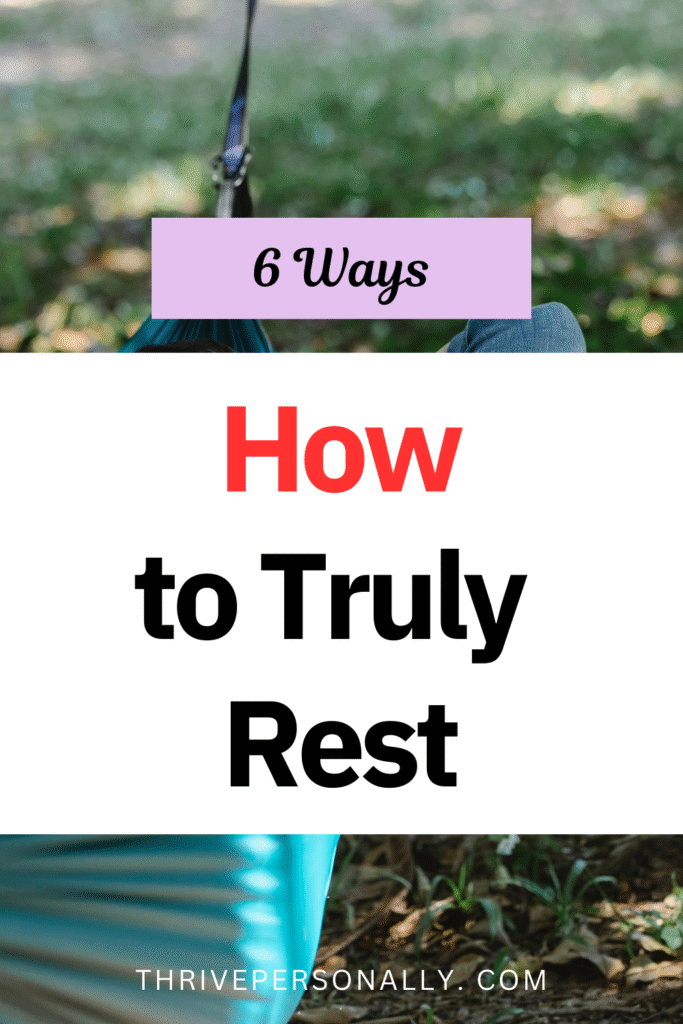Not only was I feeling slow, but I was also lethargic and in a low mood. I began to understand something important—rest is not simply “doing nothing,” and you can’t truly get it by lying still. Sleeping is an art. It’s something you must learn to protect because the world will always push you toward an over-stimulated state, even when you believe you are relaxing.
You might think you’re resting the moment you stop working, but if your brain is still racing, your emotions are tense, and your body is holding stress, then you’re not resting well at all. True sleep goes deeper—it clears your thoughts, heals your emotions, and restores your body. Without it, productivity drops, mood shifts, and health problems appear.
Even so, sleep alone is not enough. There are other forms of rest beyond lying in bed. Eight hours of sleep won’t refresh you if your mind never had the chance to truly rest.
Once you understand what rest is, and once you value yourself enough to make it a priority, you begin to live with sharper focus, more energy, and more presence than ever before. Rest must be intentional—it’s not something to leave to chance. In today’s world, where there’s always another email, another update, and another task, your body and mind need you to choose rest on purpose. When you do, you’ll notice the difference in every part of your life.
How to Truly Rest
1. Stop Your Brain
Your mind processes information constantly, whether you notice it or not. Often, when you think you’re resting, you’re still consuming a stream of new data, images, and sensations. That’s why you don’t feel refreshed after hours of scrolling through your phone or watching videos—you’ve been stimulating your brain, not resting it.
You need periods of pure mental stillness—moments when you aren’t taking in anything new. This could be a short daily break where you simply sit, breathe, and watch your thoughts without engaging them. The goal is not to control your mind but to slow it down.
Research from the University of California, Santa Barbara shows that allowing the brain to rest without new input improves memory, problem-solving, and emotional stability. Mental rest can be as brief as a few minutes or as long as an hour; the key is to let the stillness be uninterrupted.
When you give your mind this space, you invite creativity, clarity, and calm. You stop carrying the hidden mental weight that no form of entertainment can truly replace.
Read also: 8 Tips to Become More Open-Minded and Embrace New Ideas
2. Give Your Body Physical Rest
Most people think physical rest means lying on the couch or going to bed early, but it’s more than that. Your body needs active relaxation of the muscles, nervous system, and joints to recover from the daily pressures of life. Even without heavy physical labor, posture and stress can hold your body in silent tension all day.
To rest your body, try deep breathing, gentle stretching, or lying in a position that fully relaxes your muscles. Create a comfortable environment—quiet, with the right temperature, and free from tight clothing or uncomfortable seating.
Techniques like progressive muscle relaxation, which release each part of the body in sequence, have been shown to reduce stress and improve sleep (source). Even small acts—like dropping your shoulders, unclenching your jaw, and softening your back muscles—remind your body what it feels like to exist without tension.
Read also: Stop These 10 Energy Draining Habits Now
3. Take Emotional Rest
Your emotional state is shaped by the environment you keep. If you are constantly surrounded by drama, conflict, or an endless stream of news and opinions, your emotions stay on high alert.
Emotional rest means stepping back from these constant triggers. This could be time spent in silence, away from screens, people, and loud noises, or time in spaces where you feel safe and at ease.
This isn’t avoidance—it’s healing. You’re not ignoring your emotions, but giving them room to settle without being pulled in a dozen directions. Regular emotional rest reduces the risk of anxiety, depression, and even physical illness (source). It’s a safeguard for both your mind and body.
Read also: 50 Emotional Intelligence Tips You Can Try
4. Choose Restful Activities
Not every leisure activity is restful. Some hobbies or pastimes, while enjoyable, require heavy focus, energy, or emotional effort, leaving you drained afterward.
True rest comes from activities that leave you calmer, lighter, and more centered once they’re done. This looks different for everyone—some may find it in soft music, reading, or sitting outside, while others may find it in gentle movement or quiet hobbies.
Pay attention to how you feel afterward. If an activity leaves you tense, tired, or overwhelmed, it isn’t giving you the right kind of rest. Think of rest as a time for replenishing your mental and emotional reserves—not depleting them further.
5. Protect Your Sleep—The Foundation of Rest
While rest comes in many forms, sleep is the foundation. Without quality sleep, no other type of rest will fully work. During sleep, your brain and body perform vital repairs—processing memories, regulating hormones, and healing tissues.
Poor sleep affects you immediately, making you feel as though you haven’t rested at all, even after a quiet day. To protect your sleep, keep a consistent bedtime and wake-up time, limit stimulation before bed, and create a sleep-friendly environment—dark, quiet, and cool. Avoid making screens the last thing you see before closing your eyes.
Even small improvements to your sleep habits can boost your energy, mood, and focus. When sleep is strong, all other forms of rest become more effective.
6. Allow Yourself to Do Nothing
One of the hardest forms of rest is simply doing nothing. In a culture that values constant productivity, sitting still can feel like laziness or wasted time. But doing nothing is a powerful way to reset.
It slows your breathing, lowers your heart rate, and eases mental pressure. It reminds you that stillness doesn’t have to be earned—you are worthy of it simply by being human. This isn’t laziness; it’s restoration.
By giving yourself permission to do nothing, you say yes to balance, health, and a life that’s about more than just output.
Final Thoughts
Rest is not just relaxation, not just sleep, and not just the end of work. It is what your mind, body, and emotions need to recover, reset, and prepare for the future. You don’t have to wait until burnout forces you to stop. The more regularly you make space for true rest, the more energy, clarity, and peace you will bring into your life.
When you learn to still your mind, relax your body, quiet your emotions, choose nourishing activities, guard your sleep, and sometimes do nothing at all—you’re not just giving yourself rest. You’re creating a balanced, sustainable way of living, with the energy to truly enjoy it.
Save the pin for later



